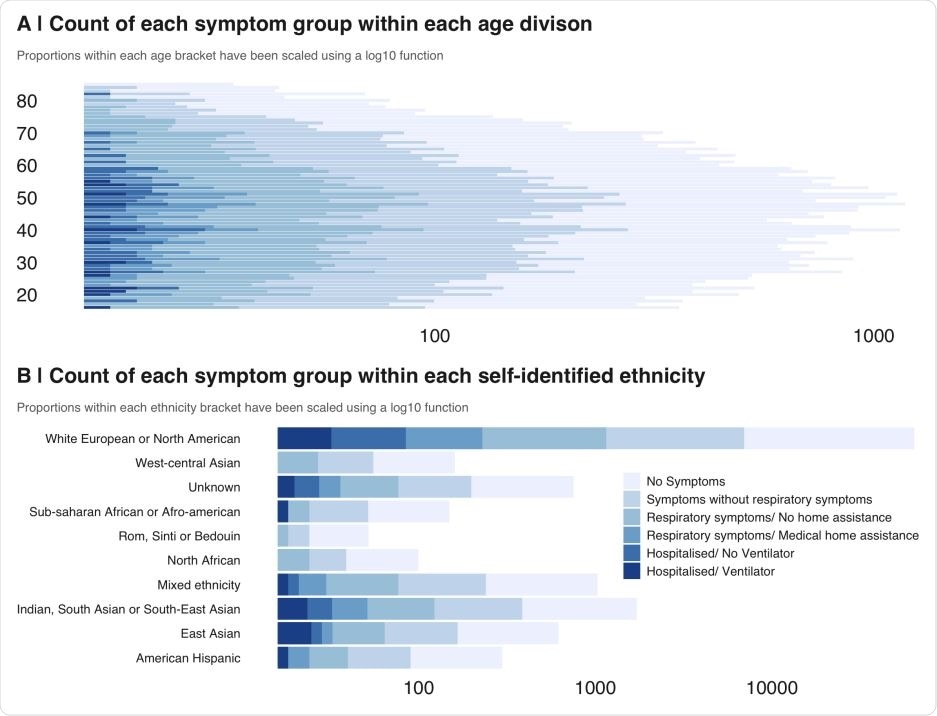Researchers in the UK and the United States have reported concerning findings showing that patients who had recovered from coronavirus disease 2019 (COVID-19) exhibited significant cognitive deficits.

The study, based on cognitive test data available from more than 84,000 participants, not only identified the deficits among people who had severe disease but also among individuals with mild disease who had not even reported breathing difficulties.
The application of generalized linear modeling (GLM) showed that the observed deficits could not be explained by differences in age, education, underlying medical conditions, or other demographic and socioeconomic variables.
“Our analyses provide converging evidence to support the hypothesis that COVID-19 infection likely has consequences for cognitive function that persist into the recovery phase,” say Adam Hampshire (Imperial College London) and colleagues from the University of Southampton, University of Cambridge, University of Chicago and King’s College London.
“These results should act as a clarion call for more detailed research investigating the basis of cognitive deficits in people who have survived SARS-COV-2 infection.”
A pre-print version of the paper is available in the server medRxiv*, while the article undergoes peer review.

The evidence so far
A growing body of evidence suggests that people who develop severe COVID-19 can develop neurological problems such as those arising from stroke, microbleeds, and inflammatory syndrome. Some studies have also reported elevated levels of autoantibodies in the cerebrospinal fluid of patients, changes in the white brain matter, and psychological consequences at the point of hospital discharge.
However, there is little information regarding whether COVID-19 is associated with cognitive impairment at the population level post-infection or across differing degrees of severity.
"Measuring such associations is challenging. Longitudinal collection of cognitive data from pre- to post-COVID is extremely problematic because the infection is unpredictable," said Hampshire and colleagues. "Furthermore, it is important to include key minority sub-populations, for example, older adults, racial-ethnic groups, and people with pre-existing medical conditions."
What did the researchers do?
The researchers conducted a large-scale, cross-sectional analysis of recovered COVID-19 patients and healthy controls adjusted for potential confounders including age, education, underlying medical conditions, or other demographic and socioeconomic variables.
The team analyzed cognitive test data available for 84,285 individuals who participated in the “Great British Intelligence Test” and who also completed a questionnaire about suspected and biologically confirmed COVID- 19.
“Due to the high visibility of the study, this cohort spanned a broad age and demographic range,” said Hampshire and colleagues.
The aim was to determine whether recovered COVID-19 patients showed any signs of cognitive deficits related to semantic problem solving, spatial working memory, selective attention, and emotional processing.
The researchers also aimed to establish whether the extent or type of deficit was associated with the severity of respiratory symptoms, which was gauged by the degree of medical assistance required.
Recovered patients exhibited significant cognitive deficits
Participants who had recovered from COVID-19 exhibited significant cognitive deficits, even after GLM had controlled for age, gender, education level, income, occupational status, racial-ethnic group, country of residence, first language, and pre-existing medical conditions.
“Individuals who recovered from suspected or confirmed COVID-19 perform worse on cognitive tests in multiple domains than would be expected given their detailed age and demographic profiles,” writes the team.
The deficits were substantial, even among non-severe cases
The effect size was not only substantial among those who had required hospitalization but also among those who had not needed hospital treatment and had not even reported breathing difficulties.
Hospitalized cases showed large-to-medium scale global performance deficits, depending on whether they had required a ventilator or not.
Compared with controls, the mean reduction in global composite score among the subgroup requiring a ventilator (-0.57 standard deviations [SDs]) was larger than the mean deficit among 512 individuals who reported previous stroke (-0.40 SDs) and the mean deficit among 1,016 who reported learning disabilities (-0.49 SDs).
“For comparison, in a classic intelligence test, 0.57 SDs equates to an 8.5-point difference in IQ,” said Hampshire and team.
Those who had not required support in hospital and remained at home exhibited small but statistically significant global performance deficits that scaled with the severity of respiratory symptoms.
The deficits ranged from -0.12 SDs among 176 individuals supported at home for respiratory difficulty; to -0.10 SDs among 3,466 who had respiratory symptoms but no medical assistance; to -0.04 SDs among 9,201 who were ill but did not have respiratory problems.
The deficits affected multiple cognitive domains
Finer grained analysis of the deficits showed that they were broad, affecting multiple cognitive domains.
However, they were more pronounced for semantic problem solving and visual selective attention than for more straightforward functions such as working memory span and emotional processing.
“People who have recovered from COVID-19 infection show particularly pronounced problems in multiple aspects of higher cognitive or ‘executive’ function,” says the team.
The researchers say this finding is in accord with preliminary reports of executive dysfunction among some patients at the point of hospital discharge, as well as previous studies of ventilated patients with acute respiratory distress syndrome prior to the pandemic.
“A fuller understanding” of the deficits is needed
“Our analyses of detailed cognitive assessment and questionnaire data from tens of thousands of datasets, collected in collaboration with BBC2 Horizon, align with the view that there are chronic cognitive consequences of having COVID-19,” say Hampshire and colleagues.
“A fuller understanding of the marked deficits that our study shows will enable better preparedness in the post-pandemic recovery challenges," concludes the team.
*Important Notice
medRxiv publishes preliminary scientific reports that are not peer-reviewed and, therefore, should not be regarded as conclusive, guide clinical practice/health-related behavior, or treated as established information.
https://news.google.com/__i/rss/rd/articles/CBMiZmh0dHBzOi8vd3d3Lm5ld3MtbWVkaWNhbC5uZXQvbmV3cy8yMDIwMTAyMi9SZWNvdmVyZWQtQ09WSUQtMTktcGF0aWVudHMtZXhoaWJpdC1jb2duaXRpdmUtZGVmaWNpdHMuYXNweNIBamh0dHBzOi8vd3d3Lm5ld3MtbWVkaWNhbC5uZXQvYW1wL25ld3MvMjAyMDEwMjIvUmVjb3ZlcmVkLUNPVklELTE5LXBhdGllbnRzLWV4aGliaXQtY29nbml0aXZlLWRlZmljaXRzLmFzcHg?oc=5
2020-10-23 00:16:00Z
CAIiELf-paJfQPhhRf38CrdUMOwqMwgEKioIACIQZdRflS9INK7zM5FkBi3R3CoUCAoiEGXUX5UvSDSu8zORZAYt0dwww8TIBg
Bagikan Berita Ini














0 Response to "Recovered COVID-19 patients exhibit cognitive deficits - News-Medical.Net"
Post a Comment